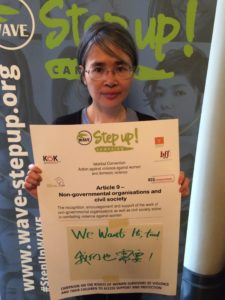 In 1995, no matter the external environment, women’s NGOs blew up in China. Today, these local NGOs still try to survive and to organize public activities, but they face the government’s agenda together with no real support from the people. “Being feminist in China is quite complicated”, summarizes Feng Yuan, a Chinese feminist activist. She was co-founder of Equality (Beijing), an NGO for women’s rights and gender equality, and a founding member of the Anti-Domestic Violence Network.
In 1995, no matter the external environment, women’s NGOs blew up in China. Today, these local NGOs still try to survive and to organize public activities, but they face the government’s agenda together with no real support from the people. “Being feminist in China is quite complicated”, summarizes Feng Yuan, a Chinese feminist activist. She was co-founder of Equality (Beijing), an NGO for women’s rights and gender equality, and a founding member of the Anti-Domestic Violence Network.
Chinese authorities are very concerned about “foreign influences” and “foreign ideology”, she explains. You are watched if you use certain kind of language that is not the official language used by the authorities. “Authorities have their own agenda and language, and if you don’t follow that, this can be a problem”, Feng says. For example, in 2015, although sexual harassment is prohibited in China, young women who planned a campaign on public transportation protesting against sexual harassment were detained for 37 days. The MeToo movement does not please the authorities either. Some women were harassed by the police for articles they had posted on social media. “When actresses from Hollywood speak out, that catches the attention, it is considered to be against good morals ”, explains Feng.
But the government’s attitude is not the only obstacle feminists have to face. The main problem is certain attitudes resonating from the public. Feminism in China is seen as “a kind of negative, bad word”, and feminists are considered “very extreme, radical people” who defy the family. “They are afraid of feminism, they don’t understand that it is a fight for equality”, Feng states. So one of the main challenges of the feminist movement is to change this kind of thinking and also, to fight against a fundamentalist environment that has been growing in China as it has in other parts of the world. Some people specifically portray feminists as criminals and man’s haters.
Towards March 8th, the Chinese feminist movement has three mayor demands: to make visible the care work that women do and to redistribute it; equal opportunity of employment for women and men, and reproductive choice: the right for every women to have or not to have children and the number of children that they want. “Some women don’t want to get married and have children, but there is strong family pressure to do so”, Feng says.
In March the annual session of the National People’s Congress in China is held, which usually gives women a chance to bring attention to the legislators and the public on gender issues and gender equality. On March 8th, in China there won’t be many public events organized by the feminist movements, but women will share their feelings on social media and will tell their stories to one another. Many women in recent years organize community dramas, story telling –on some occasions, even in coffee shops–: by telling the story of themselves, they tell the story of all.
